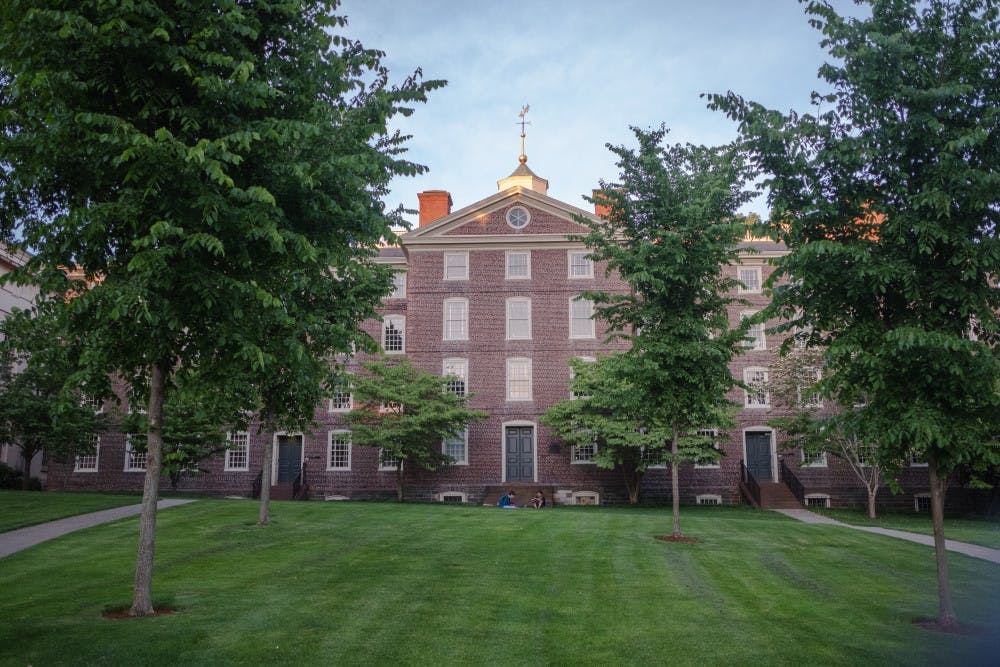The University is currently “planning intensely” in order to be prepared to implement the three-semester calendar for the coming academic year in light of the coronavirus pandemic, regardless of whether these fall, spring or summer semesters are held in person or online, President Paxson P’19 said during a special faculty meeting Tuesday.
James Morgan, professor of Cognitive, Linguistic and Psychological Sciences and chair of the Faculty Executive Committee, announced that the Faculty Executive Committee will hold a special meeting Wednesday to consider the motion to move to a three-semester calendar. Approval of this new calendar is separate from the decision about whether or not instruction is remote and would be, “in principle, only a change to the academic calendar for 2020-2021,” he added.
"Proposing the three-semester academic calendar for approval is an enabling step that would, pending that approval, position the University to move forward quickly should the three-semester scenario be decided upon for 2020-21," University Spokesperson Brian Clark wrote in an email to The Herald. But, he added, "There has been no final decision as of yet. All three scenarios remain options with a decision to come in the coming few weeks."
Paxson noted the distinction between the calendar decision and the in-person and online decision. "Even if we have to go remote in the fall, we mostly likely still would have to follow the three-semester model," she explained, adding that "in some ways you can detach the semester model from the remote or in person piece."
Previously, the University had laid out three separate plans for the 2020-21 academic year: remote fall learning, a regular in-person fall semester, or a three-semester, in-person model, in which most students would come back to campus to attend two of the semesters to reduce the number of students on College Hill during each semester and prevent the spread of the virus.
While other New England schools like Middlebury College and Boston College have announced their fall decisions, Brown has not yet finalized its plans but will do so by July 15.
Paxson said that the University will attempt to accommodate in-person learning for first-year students’ first semester on campus. To fulfill this goal, first years would need to attend the spring and summer semesters in person if the fall semester is completely remote.
“We really want the first-year students to have an in-person experience if it's at all possible,” Paxson said. ”We want to bring them back in the spring if it’s safe to do so.” In addition to the question of whether the fall semester can be held in person, the University will continue to consider whether the spring and summer semesters may be held remotely or in-person, depending on the state of the pandemic and public health.
Furthermore, faculty will decide whether their classes are offered in-person or remotely, Provost Richard Locke P’18 said. Faculty will not be required to teach in person if they do not want to.
“We are committed not to bring people back to campus unless it’s safe to be on campus. We would not ask anyone to teach in person unless it was safe to do so,” Locke said.
Paxson agreed with Locke and added that the option for classes to be offered in-person or online will remain dependent on the continuously evolving condition of public health.
Results of re-openings in the Northeast and Rhode Island have made Paxson optimistic about returning to the University for in-person instruction, although she said she is “disheartened” by results seen in southern and western parts of the United States.
Still, Paxson emphasized that the University will not reopen campus if it is not safe for students to return.
“We are planning intensely for a three-semester (year and) de-densified fall. If it comes in August and it just is clear that it won't be healthy and safe to do that, then we would retreat,” Paxson said. “It isn't like some decision has been made and we are just moving forward regardless of the health circumstances — we are paying careful attention.”
During the meeting, Locke also provided updates regarding current planning for academic continuity in case of a three-semester calendar or remote learning.
Following the May 21 announcement that departments, centers, institutes and concentrations needed to submit an academic plan for the three-semester model, Locke reported that 61 out of the 62 academic clusters have already submitted their plans. Thirty-three of the submitted plans have been approved by the University thus far.
Locke also discussed further what an in-person instruction model could look like while trying to prevent the spread of COVID-19.
If in-person learning takes place, classes and sections will be restricted to 20 students or fewer.
Departments with strict sequence requirements — like languages and sciences — will need to adjust their requirements to the new calendar.
Paxson stated that the University plans to host an open discussion on July 15, as well as another faculty meeting and forum on an as-yet unspecified date to continue discussing plans for the coming academic year.
Correction: Due to an editing error, a previous version of this article stated that faculty will be required to teach in person if they do not want to. In fact, faculty will not be required to teach in person. The Herald regrets the error.

ADVERTISEMENT
More




